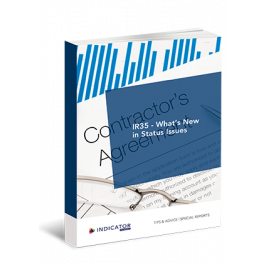1. IR35, what is it and how does it affect tax and NI?
1.1. What is IR35?
1.2. What are the “off-payroll” rules?
1.3. What’s the effect of IR35 on tax and NI?
2. Employment status
2.1. How to use this part of the Report
2.2. Who and what does IR35 apply to?
2.3. What are the three key conditions when considering employment status?
2.4. Financial risk - is there a risk of making a loss?
2.5. Is there an opportunity to increase profit?
2.6. What are the length and number of engagements?
2.7. Do I have a business structure?
2.8. Do I work exclusively for one client?
2.9. What are the terms of payment?
2.10. Is there a right of dismissal?
2.11. Am I part and parcel of the organisation?
2.12. Employment status - summary
3. Contracts and arrangements
3.1. What parts of the contract are especially important for IR35?
3.2. What basic rules should be followed if IR35 is to be avoided?
3.3. Why is a substitution clause so important?
3.4. What about paying a substitute?
3.5. How should a substitution clause be worded in a contract?
3.6. What other terms should be covered in a contract?
3.7. Should I write the contract myself?
3.8. Can HMRC imply terms into a contract?
3.9. What if an implied term is not consistent with a written one?
4. Dealing with HMRC
4.1. Can IR35 clearance be given by HMRC?
4.2. What’s HMRC approach to IR35?
4.3. How likely is an IR35 investigation?
4.4. Do the off-payroll rules affect the likelihood of an enquiry?
4.5. What sort of evidence is important in an IR35 enquiry?
4.6. How should an HMRC compliance check be handled?
4.7. Are there special reporting rules to identify payments potentially caught by IR35?
4.8. What if there is more than one business activity?
5. IR35 tax and NI regulation
5.1. Overview
5.2. What is an intermediary?
5.3. How do the rules for contracts fit with those for IR35?
5.4. What’s the position where work is provided through an agency?
5.5. What is the tax position of work done outside the UK?
5.6. What is the NI position of work done outside the UK?
6. IR35 calculations
6.1. How is the IR35 deemed payment worked out?
6.2. What are the special rules for travel expenses?
6.3. Are there exceptions to the rules?
6.4. What’s the effect of deemed payments on other taxes?
7. The off-payroll rules
7.1. Why were the off-payroll rules introduced?
7.2. When do the off-payroll rules for public bodies apply?
7.3. When do the off-payroll rules for private sector clients apply?
7.4. How does the off-payroll process work?
7.5. What are the tax and NI consequences where the off-payroll rules apply?
7.6. What if there’s disagreement with the client’s status determination?
7.7. What steps are required if it’s decided that IR35 applies?
7.8. How much tax and NI will be paid on income to which IR35 applies?
8. Case studies
8.1. Case study 1 - IR35 and off-payroll rules apply
8.2. Case study 2 - amending a status determination statement
8.3. Case study 3 - client not responsible for determining employment status
8.4. Case study 4 - accounting entries where dividends are paid from IR35 income
9. Appendices
9.1. Appendix A - Claiming relief example
9.2. Appendix B - List of IR35 employment status cases
9.3. Appendix B cont. - judgment quotations
9.4. Appendix C - IR35 - prevention of double taxation claim
9.5. Appendix D - Deduction for deemed employment payment letter
9.6. Appendix E - HMRC guidance material



 (01233) 653500
(01233) 653500 








